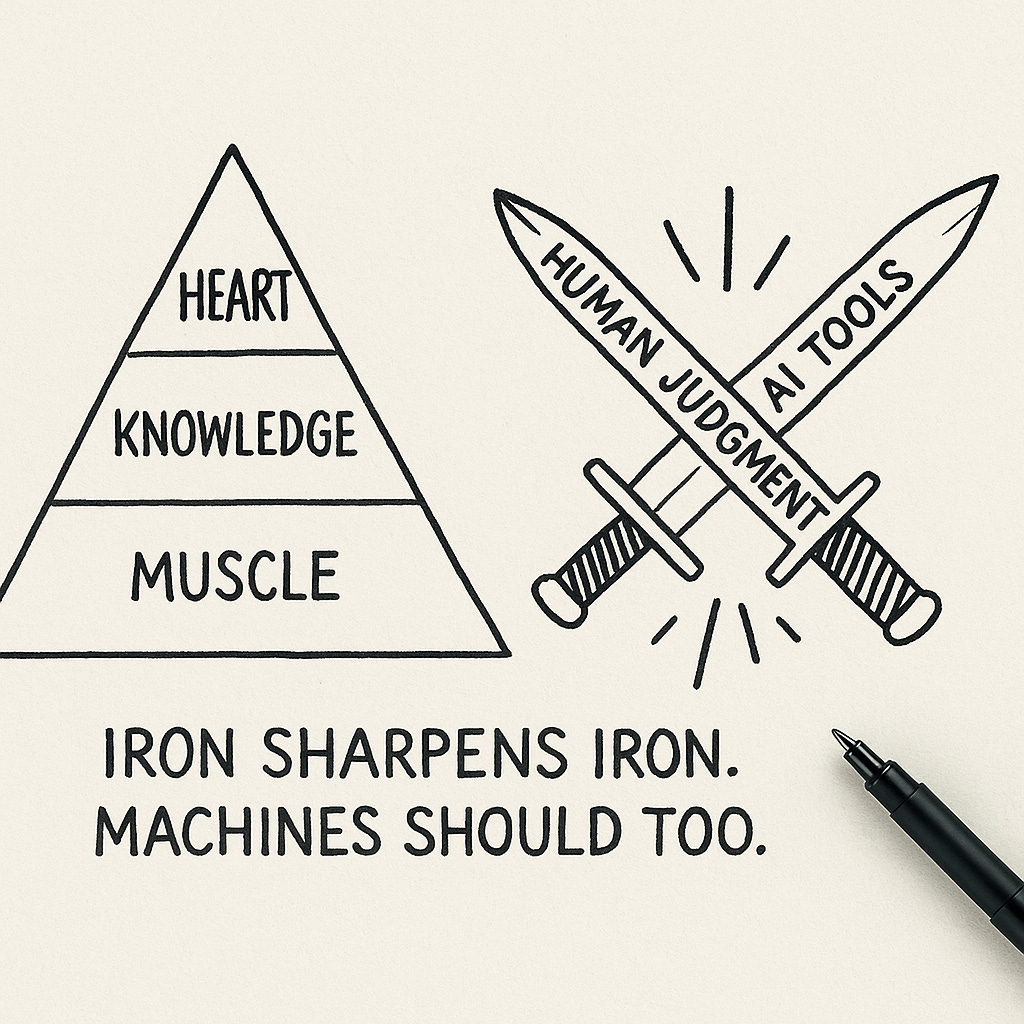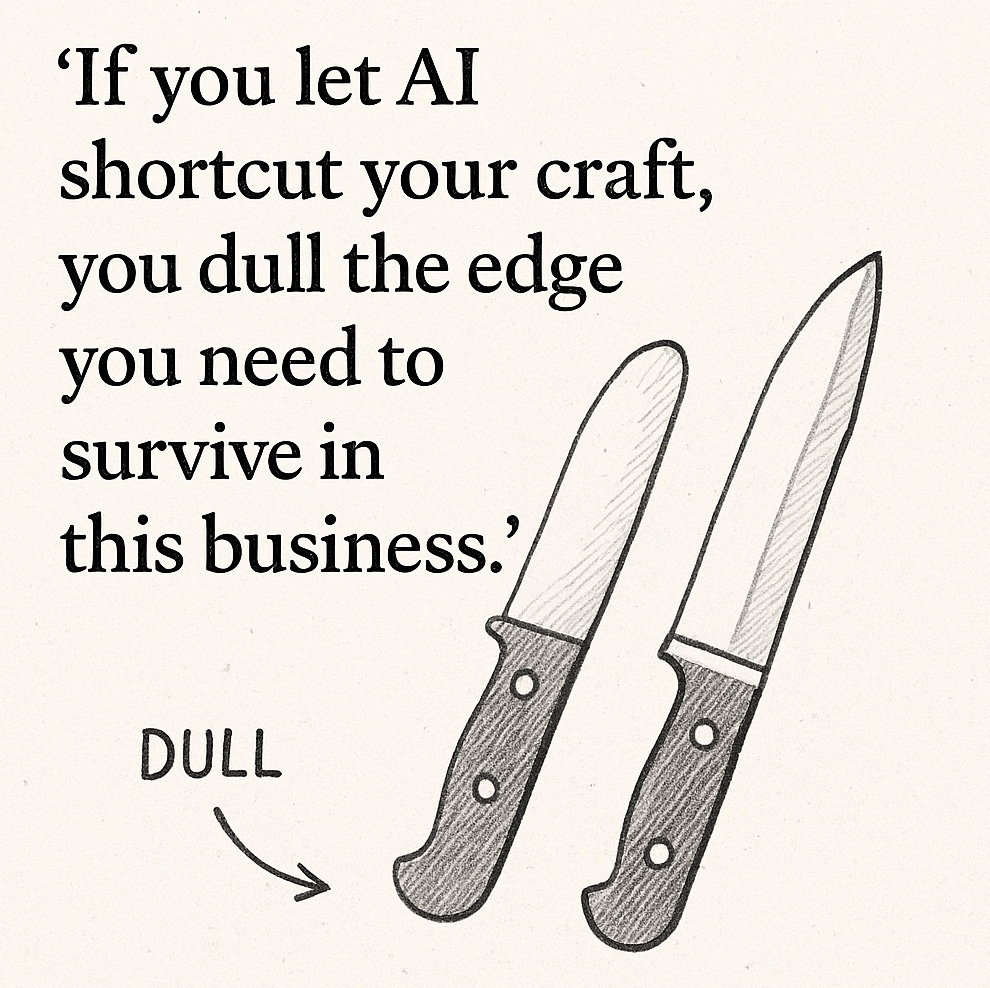Iron, Machines, and Heart
Why the best venture investors (of the AI era) will know which tools sharpen, which tools dull, and why relationships remain the sharpest edge of all.
Everyone in venture is experimenting with AI. Some see it as a compounding advantage. Others worry it’s a crutch.
A conversation with a friend, a solo GP, brought this home. He told me how incredible a conversation assistant AI tool was that he was using for diligence calls. Faster answers, sharper data in real time. But after a while, he realized he wasn’t learning. He was being force-fed. He was outsourcing the very gray matter that critical thinking requires to make you sharper.
That’s the risk. If you let AI shortcut your craft, you dull the edge you need to survive in this business.
Venture at its core is still about three things: sourcing, selecting, and winning top decile deals. Tools should help you do those better. But they can’t replace the judgment required to know why you source, why you select, and how you win. If you hand those over to the machine, you aren’t compounding. You’re hollowing out.
My friend course-corrected. He went back to doing the inital work himself, digging into information, modeling, building conviction, and then using the tool to push harder. What’s the next question I should be asking? What data can I pressure-test with this founder? That’s when AI is enhancing an investor instead of replacing one.
It made me think of my favorite proverb: Iron sharpens iron. I’ve always applied that to people. Now I think it applies to machines too. Some tools sharpen you. Others dull you. The real test is whether they suppress your human talent or amplify it.
Here’s the piece of humor that drives the point home: if you’re not a great listener, why are you using audiobooks? You won’t retain it. The tool doesn’t fit the human. It’s the same with investing. You must be honest about your skills and gaps, or you’ll reach for the shiny tool that actually makes you worse.
A Columbia professor recently framed history this way: the Industrial Revolution was about muscle. The late 20th century was about knowledge. AI shifts the advantage again. When knowledge is democratized, the differentiators become heart, empathy, resilience, discernment, and trust. That is what endures when the models converge.
So the question for emerging managers is this: are you building a firm that uses AI to scale up your people, or to shortcut around them? If I were an LP, I wouldn’t back a firm that wasn’t fully integrating AI into its processes (How can you invest in the technology if you don’t understand its benefits?). But I also wouldn’t back one that lets AI erase the gray matter that makes investors worth listening to.
For me, this interim period between leaving my institutional firm and building Stresswood has been a lab. I’m tinkering with SPVs and obsessed with the numbers 5 and 150, which represent the limited number of people who influence you and Dunbar’s number, indicating the maximum number of relationships one can maintain. Why shouldn’t technology break those ceilings? Why shouldn’t it expand the five, multiply the 150, and help me do what I’m already built to do, connect, remember, and compound relationships?
That’s why I’m exploring agentic relationship management. Tools like Relateable, Happenstance, and Goodword (and many others), or the CRM builds I’m prototyping, are not about replacing my instincts. They’re about multiplying them. They’re about ensuring I never lose track of the dots I can connect, the trust I can compound, the experiments I can enable.
Because here’s the truth: I’ve always been a professional outsider. It’s the only way I know how to sharpen. I break into rooms where I’m not expected, I ask questions that aren’t supposed to be asked, and I connect people who might never have found each other otherwise. And I believe venture needs more of that.
A friend, an operator, wrote something that captures it better than I could:
“It is my belief that those in positions of power possess very little original thought. They are limited by constraints like budgets, old ways of thinking, returns for investors, and pressure from other nations, employees, constituents, or peers. The new ideas, the ever-heralded phenomena of innovation, exist down below and in the margins where there is freedom to experiment. The world needs these experiments.”
That’s it. Innovation doesn’t trickle down from the top. It bubbles up from the margins. A group of professional outsiders, supported by agentic platforms that amplify human memory and relationships, can connect those margins to spark more experiments.
This is how I’ve always learned. This is how I’ve always invested. It’s the only way I’ve built anything of real value: by sharpening myself outside of my comfort zone, in conversation with others, in relationships with others, and now in dialogue with machines that either make me duller or sharper.
Iron sharpens iron. Machines should, too.
~ Earnest Sweat





I had a similar experience using AI for my DD process. The last investment we made, AI was a huge help in creating tables to break down complex aspects of the business into smaller, more digestible parts. I developed two artifacts that I shared with other investors (and my team) to clearly lay out the the finer points of this fintech company to the non-finance folks.
The most recent potential investment that I'm working on is also very complex. What's funny is that I started out using Claude to give me research on the hardest part of the industry—a sector that is a tarpit. Because I started there, Claude hates this company 🤣 Its analysis always leans negative, sometimes ignoring facts that are part of the project knowledge base.
Reading your post makes me recognize my own pattern here: I slipped into asking for asking for analysis instead of asking for information, and without realizing it I went back to using it as a tool to synthesize and explain my own analysis.
But coming full circle, it has been helpful to have a strong negative opinion from Claude to sharpen my thinking as I try to figure out if this is the right investment to make.
Debate partner > cantankerous analyst.